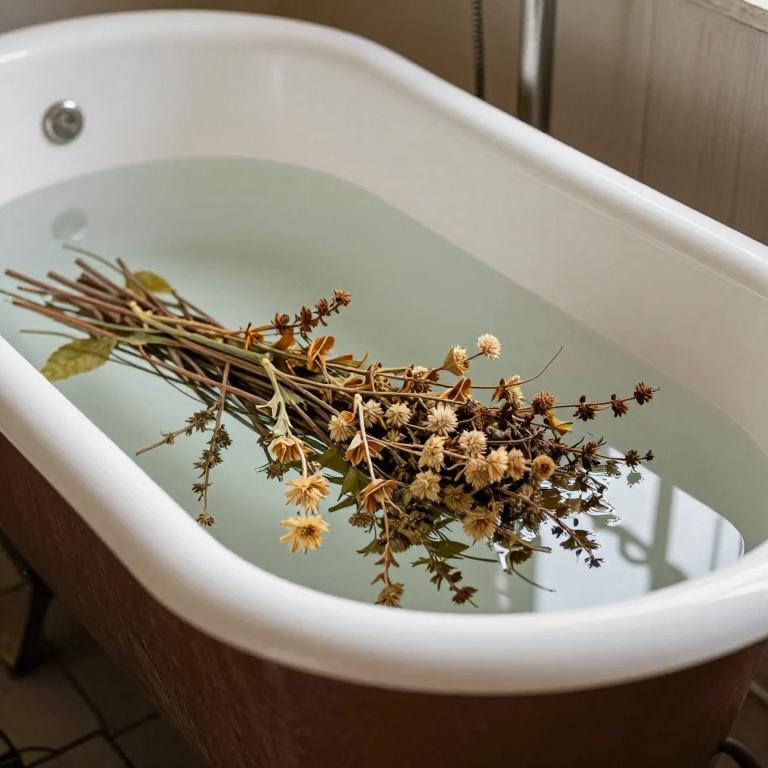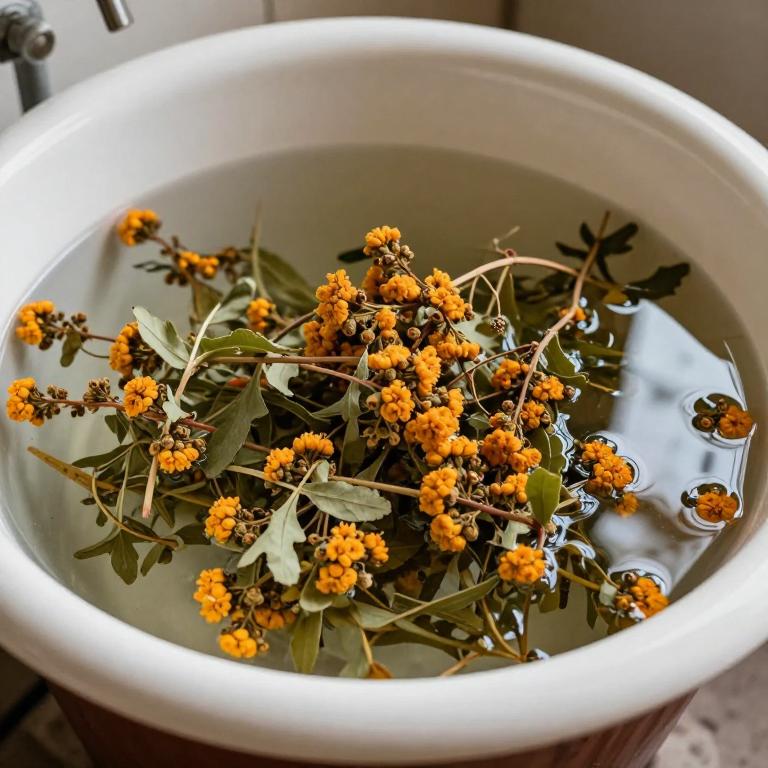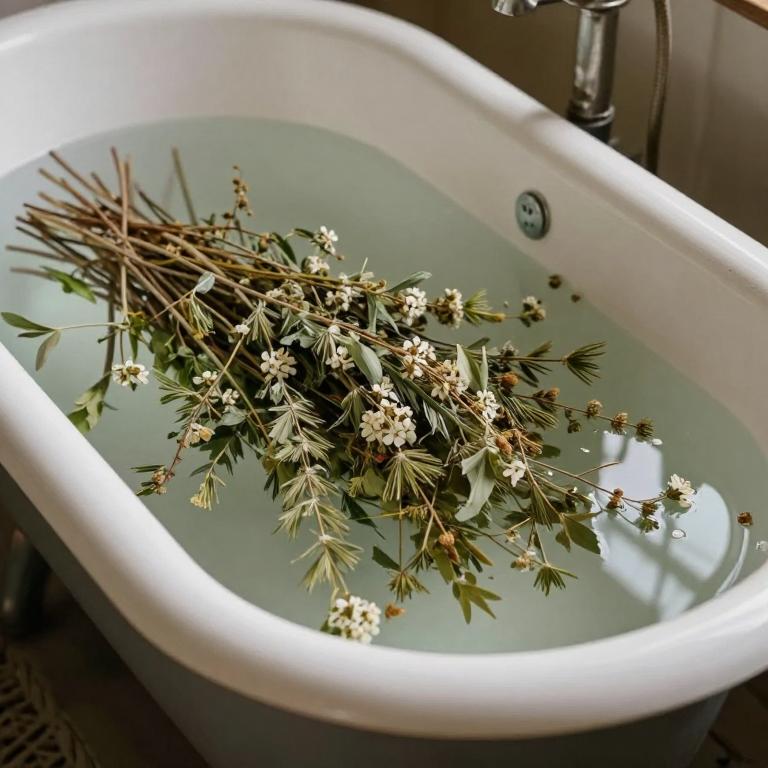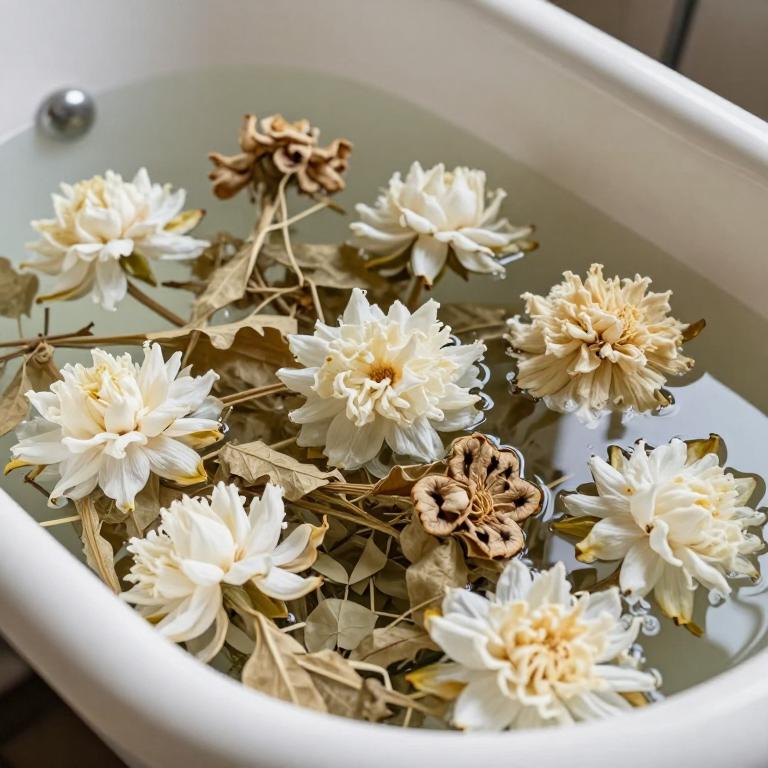10 Best Herbal Baths For Menopause

Herbal baths can be a soothing and natural remedy for managing menopause symptoms, offering relief from hot flashes, anxiety, and sleep disturbances.
Certain herbs like lavender, chamomile, and oatstraw are known for their calming properties and can help promote relaxation and reduce stress. These baths also provide a gentle way to support hormonal balance and improve overall well-being during this transitional phase. By incorporating warm water and herbal infusions into a daily routine, menopausal women may find comfort and a sense of self-care.
Overall, herbal baths serve as a holistic approach to easing the challenges of menopause while nurturing both physical and emotional health.
Table of Contents
- 1. Stinging nettle (Urtica dioica)
- 2. Black cohosh (Cimicifuga racemosa)
- 3. Field horsetail (Equisetum arvense)
- 4. Rosemary (Rosmarinus officinalis)
- 5. Chaste tree (Vitex agnus-castus)
- 6. English lavender (Lavandula angustifolia)
- 7. St. john's wort (Hypericum perforatum)
- 8. Valerian (Valeriana officinalis)
- 9. Yarrow (Achillea millefolium)
- 10. White water lily (Nymphaea alba)
1. Stinging nettle (Urtica dioica)

Urtica dioica, commonly known as stinging nettle, has been traditionally used in herbal baths to support women during menopause.
These baths can help alleviate symptoms such as hot flashes, mood swings, and joint pain by promoting hormonal balance and reducing inflammation. The plant is rich in minerals like iron, magnesium, and calcium, which can nourish the skin and support overall well-being. When infused into water, stinging nettle creates a soothing, nutrient-rich bath that may also improve circulation and relieve stress.
While generally safe, it is advisable to consult a healthcare provider before using nettle baths, especially for those with sensitive skin or existing medical conditions.
2. Black cohosh (Cimicifuga racemosa)

Cimicifuga racemosa, also known as black cohosh, is a commonly used herbal remedy for managing menopausal symptoms such as hot flashes, night sweats, and mood swings.
Herbal baths infused with cimicifuga racemosa may help alleviate these symptoms by promoting hormonal balance and reducing inflammation in the body. The active compounds in black cohosh, such as triterpene glycosides, are believed to interact with the body's estrogen receptors, offering relief similar to some conventional treatments. While herbal baths can be a soothing addition to a holistic approach, it is important to consult a healthcare provider before use, especially for individuals with existing health conditions or those taking other medications.
Overall, cimicifuga racemosa herbal baths may provide a natural, alternative option for menopausal women seeking relief from discomfort.
3. Field horsetail (Equisetum arvense)

Equisetum arvense, commonly known as field horsetail, has been traditionally used in herbal baths to support women during menopause due to its high concentration of silica and other minerals.
These baths are believed to help alleviate symptoms such as joint pain, skin dryness, and fatigue that often accompany menopause. The anti-inflammatory and detoxifying properties of horsetail may promote overall well-being and balance hormonal fluctuations. To prepare the bath, fresh or dried horsetail is steeped in hot water and then added to warm bathwater, allowing for skin absorption of its beneficial compounds.
While generally safe, it is important to consult with a healthcare provider before using horsetail baths, especially for those with kidney conditions or allergies.
4. Rosemary (Rosmarinus officinalis)

Rosmarinus officinalis, commonly known as rosemary, is a versatile herb that has been traditionally used for its aromatic and therapeutic properties.
Herbal baths infused with rosemary can provide relief from menopausal symptoms such as hot flashes and mood swings by promoting relaxation and improving circulation. The essential oils in rosemary are believed to have a calming effect on the nervous system, helping to reduce stress and anxiety during this transitional phase. Additionally, the anti-inflammatory and antioxidant properties of rosemary may support overall hormonal balance and skin health.
Incorporating rosemary into a warm bath can be a soothing and natural way for women undergoing menopause to enhance their well-being and comfort.
5. Chaste tree (Vitex agnus-castus)

Vitex agnus-castus, commonly known as chasteberry, has been traditionally used to support hormonal balance during menopause.
Herbal baths infused with vitex can help alleviate menopausal symptoms such as hot flashes, mood swings, and sleep disturbances by promoting relaxation and reducing stress. The calming properties of vitex may also support emotional well-being, which is often affected during this transition. To use vitex in a bath, it is typically steeped in hot water and added to the bathwater for a soothing soak.
While herbal baths can be a complementary therapy, they should not replace professional medical advice, especially for those with underlying health conditions.
6. English lavender (Lavandula angustifolia)

Lavandula angustifolia, commonly known as English lavender, has been widely used in herbal baths to alleviate menopausal symptoms.
The calming and aromatic properties of lavender can help reduce stress and anxiety, which are common during menopause. Soaking in a lavender-infused bath can promote relaxation and improve sleep quality, essential for managing hormonal fluctuations. Additionally, lavender's anti-inflammatory and soothing effects may help ease hot flashes and skin dryness associated with this life stage.
Incorporating lavender into a regular bathing routine can be a natural, gentle way to support overall well-being during menopause.
7. St. john's wort (Hypericum perforatum)

Hypericum perforatum, commonly known as St. John’s wort, has been traditionally used in herbal baths to support women during menopause by alleviating symptoms such as hot flashes, mood swings, and sleep disturbances.
When infused into bath water, the essential oils and active compounds of Hypericum perforatum may help soothe the nervous system and promote a sense of calm, offering a natural alternative to conventional treatments. These baths can also provide a relaxing and rejuvenating experience, helping to ease the physical and emotional stress associated with hormonal changes. While herbal baths are generally considered safe, they should be used with caution, especially if the individual is taking other medications, due to potential interactions.
Incorporating Hypericum perforatum into a self-care routine can be a gentle and holistic way to support overall well-being during the menopausal transition.
8. Valerian (Valeriana officinalis)

Valeriana officinalis, commonly known as valerian, is a traditional herbal remedy that has been used for centuries to support relaxation and improve sleep quality.
When incorporated into herbal baths, valerian can help alleviate the symptoms of menopause, such as restlessness and insomnia, by promoting a calming effect on the nervous system. The essential oils and compounds in valerian, such as valerenic acid, are believed to interact with the brain's GABA receptors, reducing anxiety and enhancing mood. To use valerian in a bath, one can add a few drops of valerian essential oil or a valerian-based bath product to warm water, allowing the soothing aroma to penetrate the skin and relax the mind.
While valerian baths may offer natural relief for menopausal discomfort, it is advisable to consult with a healthcare professional before incorporating it into a wellness routine.
9. Yarrow (Achillea millefolium)

Achillea millefolium, commonly known as yarrow, has been traditionally used in herbal baths to support women during menopause by promoting hormonal balance and easing symptoms such as hot flashes and mood swings.
When infused into bathwater, yarrow's anti-inflammatory and soothing properties can help reduce skin irritation and promote relaxation, which is particularly beneficial during this transitional phase. The aromatic compounds in yarrow may also aid in reducing stress and anxiety, common challenges for women experiencing menopause. Herbal baths with yarrow can be a gentle, natural complement to other menopausal care routines, offering a calming and nurturing experience.
However, it is advisable to consult with a healthcare provider before using yarrow baths, especially for those with known allergies or medical conditions.
10. White water lily (Nymphaea alba)

Nymphaea alba, commonly known as white water lily, has been traditionally used in herbal baths to support women during menopause due to its calming and nourishing properties.
The plant's flowers and leaves contain compounds that may help alleviate menopausal symptoms such as hot flashes, night sweats, and anxiety. Soaking in a bath infused with Nymphaea alba can promote relaxation and balance hormone-related discomfort. This herbal remedy is often combined with other botanicals like lavender and chamomile to enhance its soothing effects.
While it is generally safe, it is advisable to consult a healthcare provider before using it, especially for those with existing medical conditions or on medication.